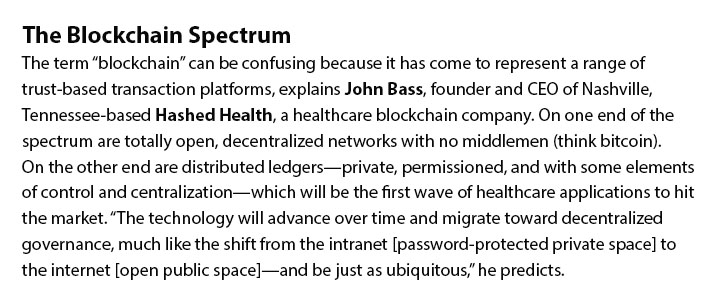Blockchain-Secured, Patient-Controlled Health Records
Blockchain, the technology behind bitcoin, has a surprising degree of relevance for healthcare. It has already found real-world applications (and potential ROI) in reducing the time it takes to credential physicians and underpins an emerging decentralized marketplace for the exchange of digital services and currency. It is also driving collaboration and creative problem-solving around some of the industry’s most vexing cost and quality problems, and ongoing shift toward more patient-centered, outcomes-oriented care. In this series of stories, Clinical Informatics News writer Deborah Borfitz looks into emerging use cases for blockchain in health care and clinical trials, and speaks with some of the companies breaking new ground. --AP
By Deborah Borfitz
May 8, 2018 | Physicians are particularly enthusiastic about blockchain’s potential to restore their clinical autonomy and relationship with patients by cutting out unnecessary middlemen. In the case of electronic health records (EHRs), the disintermediated parties would include hospitals and EHR vendors by shifting ownership to individual patients. It is arguably the most valuable use case for blockchain, and certainly the most popular. Among the 50 or so blockchain-based healthcare startups worldwide, about 75% are focused on medical records on the blockchain, estimates John Bass, founder and CEO of Nashville, Tennessee-based Hashed Health, a healthcare blockchain company.
The players behind the Health Information Exchange (HIE) of One are largely physicians. Together with patients, they’ll be the ones controlling health records as well as access to machine learning and AI, predicts Adrian Gropper, M.D., chief technology officer for the Patient Privacy Rights Foundation and a participant in the open-source blockchain pilot project. Independent health records will also eliminate trust barriers to inclusion of important data elements, such as social determinants of health, which have implications for quality measures, risk adjustment, and reimbursement. So long as health records are controlled by a hospital or a national HIE, “no one will trust the really cool stuff that impacts everything from your mental health to how fast you recover from surgery.” Hospital-based EHRs also tend to impede shared decision-making, including where patients go for specialty care as well as which drugs get prescribed and where they’re purchased.
Blockchain could enable five of seven EHR functions to completely disappear from hospitals’ control, says Gropper, including user authentication, physician credentialing, coding, reimbursement, and records retention. The patient-provider “matchmaking” function of current EHR systems could be handled by patients themselves, community groups, or payers. And aspects of the blockchain that are applicable to financial auditing could be applied to reputation management. Physicians could reach into patient records directly based on their credentials. “HIE of One will put data brokers out of the analytics business,” Gropper says.
From Gropper’s perspective, blockchain will also eliminate all the “secrecy” in medicine that unnecessarily fragments healthcare and creates the opportunity for large-scale privacy breaches like the recent Equifax and Facebook incidents. Regulators, he charges, have been hyper-focused on security while effectively enabling surveillance capitalism. All that would change if patients, rather than data brokers, were the ones selling the data—and for a fair market price or public benefit.
The long-term goal of HIE of One is to move control of health records to the community or population level, Gropper adds, which would annually save the broader U.S. healthcare system a trillion dollars in waste, fraud, and abuse. “It is going to happen because control of health records will be distributed not to Google or Facebook or a hospital or national database but to 100 different or maybe even 1,000 different interest groups that could be regional or could be around a particular disease with no geographic border.” The resulting medical knowledge will be openly shared for the greater good, not hoarded in proprietary, money-making databases.
Gropper is currently trying to put together two blockchain-based pilots, including one in collaboration with Marlene Smitherman, CEO of Critical Connection, Inc., a physician-backed HIE in Austin. Smitherman says a good first step would be for Gropper to team up with Integral Care, which provides mental health and substance abuse services in Travis County, Texas, and a few federally-qualified health centers located in neighborhoods with high rates of infectious diseases. Blockchain might prove valuable in the safety net environment by providing access to data that is currently excluded from both EHRs and HIEs due to confidentiality concerns. The reality is that physicians don’t want patients showing up with their own personal health record that’s not a part of an existing EHR, she says. “They just don’t have time.”
In a similar vein, Emory Healthcare in Atlanta is looking at creating a portable medical record for the homeless as a use case for blockchain technology, Gropper says. This would solve the problem of caring for patients who often have mental health and substance abuse problems and get their care in many disparate healthcare facilities. Their records are often inaccessible, and they typically don’t recall the name or doses of their medications, the name of the doctors who were prescribing them, or the last time they had lab work or the results.
The homeless health record project could store private data off-chain in a place where it’s easily moved if the patient chooses—something most people already do with their cell phone, bank and Dropbox accounts, Gropper notes, and Apple is now doing with health records via its Health app. Blockchains would allow homeless people “to control who can access their health record and to keep them accountable to prevent abuse.”
Behind all decision-making on the blockchain are “consensus algorithms,” representing many years’ worth of code, says Gropper. Much of the initial funding to drive standards across multiple blockchains is coming from the Department of Homeland Security. This includes the original Rebooting the Web of Trust group actively working on at least five different blockchains.








